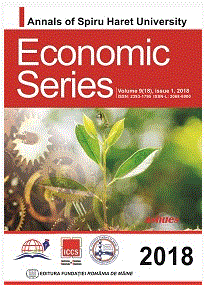EFECT OF FOREIGN EXCHANGE RATE FLUCTUATIONS ON NIGERIAN ECONOMY
EFECT OF FOREIGN EXCHANGE RATE FLUCTUATIONS ON NIGERIAN ECONOMY
Author(s): Lawrence Olisaemeka UFOEZE, Camilus N. OKUMA, Udoka Bernard AlajekwuSubject(s): Economy, National Economy, Financial Markets, Public Finances
Published by: Editura Fundaţiei România de Mâine
Keywords: exchange rate fluctuation; inflation; money supply; oil revenue; gross domestic product;
Summary/Abstract: This study investigated the effect of exchange rate fluctuations onNigerian economy. The fixed and floating exchange eras were compared to knowthe exchange rate system in which the economy has fairly better. The time periodcovered was 1970 to 2012. The study employed the ordinary least square (OLS)multiple regression technique for the analysis. The coefficient of determination(R2), F-test, t-test, beta and Durbin-Watson were used in the interpretation of theresults. The resulted revealed that about 85% of the changes in macroeconomicindicators are explained in the fixed exchange era. In the floating exchange era,99% was explained while the whole periods has 73% explanatory power, hencethe floating exchange era (1986 to date) is more effective in explaining economictrends in Nigeria. Also, exchange rate has significant positive effect on GDPduring the fixed exchange rate era and negative effect during the eras floatingand all-time; inflation has insignificant negative effect on GDP during the fixedexchange era; significant effect in floating era and significant negative effect inthe all-time period; money supply has insignificant negative effect on GDPduring the fixed exchange era; and significant positive effect during the floatingand all-time period; and oil revenue has significant positive effect on the GDP inall the exchange rate regimes (floating, fixed and all-time) in Nigeria. The studythus concludes that exchange rate movement is a good indicator for monitoringNigerian economic growth. So far, exchange rate has always been a keyeconomic indicator for Nigeria. The floating exchange period has outperformedthe fixed exchange rate in terms of contribution inflation, money supply and oilrevenue to economic growth. This indicates that the floating exchange rate hasbeen a better economic regime for sustainable economic growth in Nigeria.
Journal: Annals of Spiru Haret University. Economic Series
- Issue Year: 18/2018
- Issue No: 1
- Page Range: 105-122
- Page Count: 18
- Language: English

